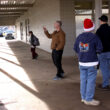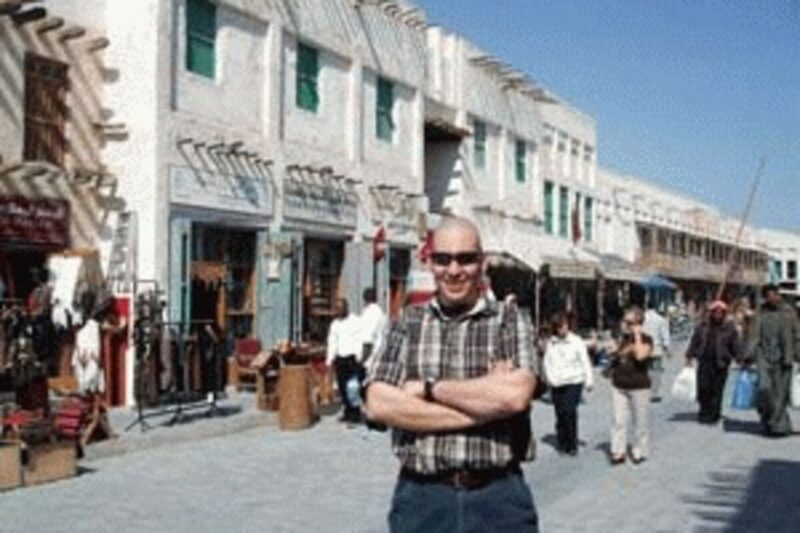Sean C. Morgan
Of The New Era
It’s “Groundhog Day” in the desert for some as they repeat the same actions day in and day out, with just small differences.
In times like that, faith, family and friends make it easier to get through.
Air Force Staff Sgt. Josh Peargin and the 30th Space Wing was among troops in the Middle East for seven months this year. The Sweet Home man left for an “undisclosed base in southwest Asia” as a combat correspondent in January and returned to Vandenberg Air Force Base in California in July.
During his time there, his job was to get information out to the media and public as quickly as possible following an operation.
Now that he is home, he is a videographer, which means he does videography, broadcast and graphic design, Peargin said. Right now, he is reporting news.
Peargin’s job was to show the American people back home what was going on. The technology available makes it easy.
In the war zone, he worked with weapons systems video, he said. “You’ve got to get the video footage coming off the fighter jets, the Predators and the Reapers, all these things. When the strike happens, the people that do that actual strike send the video to us.”
Peargin and one coworker would sanitize the videos of top-secret material and prepare it for release to the public, he said. They also don’t release bad footage or material that is not self-explanatory.
In many of the videos, the targets are visible with weaponry, but in others they aren’t, he said. These videos often end up on YouTube, but without the storyboards and explanations that go with them, those videos can look bad in terms of public relations.
The military will release some videos like that when the target is high-profile, he said. Within his area of responsibility, among high-profile targets hit was al Qaeda’s second in command. In another video, an entire terrorist cell was wiped out with an air strike.
Much of the time, the video tells the whole story, and no explanation is necessary, Peargin said. “Just with the video alone, it is justified – the strike. At first, it was a huge eye-opener. You’re not directly there, but you’re still seeing the major facts of it. You’re like, ‘This is cool.’ But you stop and think, those are real people.”
He described the feeling in a journal entry on an average day:
“It’s time to get to work, ‘So how many people died yesterday?’ This is the question I have come to ask on a daily basis as I boot up my computer. I check my mail, and it confirms that there is work to be done. Just as I thought, bombs dropped and the bad guys died. It’s nothing new. I’ve been doing it for a month straight now.
“The second job isn’t so basic though. In this one there are three people getting ready to attack someone and we swoop in and blow them up; however, the third man was farther away than the other two. The blast threw him across the screen, most of him. He lay there grabbing the stump that used to be his leg with his mouth wide open obviously screaming in pain. He rocked back and forth until he slowly came to a still stop and his screams became silent.
“For the first time, I had no idea how to feel. This should be obvious; he was the enemy. He was preparing to take the lives of fellow Americans or innocent civilians. This is one less person to take away innocent lives by strapping a bomb to his chest and running into a building. Then again this was someone’s father, husband, someone’s loved one who wouldn’t be coming home ever again.”
That was when Peargin had to change the way he approached his job, he said.
“That’s the thing that makes us human, if we still have those feelings. I had to start looking at it as actually just watching TV.
“I had to stop looking at it as actual people. They’re the bad guys.”
It wasn’t the same as becoming numb to it, he said. Rather, he had to separate himself from the reality of it to allow him to do his job.
“We were actually helping the Iraqi nation to fight back against a terrorist organization,” he said. It was “almost a civil war. We helped quell that. Without our help, this person that was leading this rebellion would’ve won. Had we not been there to support them, Iraq would’ve gone back to being a terrorist country.”
While working, he and his partner would have CNN up and running, he said.
“No sooner had we kicked it out, it was allowing the American people to know what’s going on.”
Modern military technology, such as unmanned aircraft, makes it possible to do things quickly and much more safely.
A Predator can cover a city in an hour. The drones can relay enemy activity and positions.
In one incident, a Predator was used to pinpoint the location of a mortar team attacking a U.S. base, Peargin said. With that information, troops were easily able to dispatch the mortar team.
“The nice thing about that is there’s no chance for a human casualty,” Peargin said. The loss of a Predator in combat is just “money compared to human lives.”
Peargin is married to Rose of Belleview, Wash. They have no children, he said, just a dog and a cat. He graduated from Sweet Home High School in 1998. He assisted his father, Doug Peargin, coaching swimming for about five years.
He is coming up on his sixth year in the Air Force. Peargin expects he may be in the service until he retires “unless God calls me out.” In that case, he plans to continue to serve in the National Guard or the reserves.
“The Lord called me into the service,” he said.
After high school, he attended Linn-Benton Community College, he said. He was in nursing, but twice, he ended up sick and unable to complete the program. After missing a week or two, it is difficult to catch up.
“I’m like, ‘OK, Lord, is this something you’re telling me not to go into?'” Peargin said. Out of the blue, a recruiter from Ohio called him at about that time.
Peargin is considering doing something else now, he said.
“What I’m kind of looking at and praying about is a program called Troops to Teachers,” he said. Timing it right, he could retire from both fields and get back to Oregon.
“I’ve prayed about it, and that’s where my heart is,” he said. “I’ve been all around the world (twice all the way around).”
He has been to Japan, Germany, Ireland and 30 to 40 U.S. states.
“I’ve been everywhere, and there’s no place better than the Valley,” he said. The people, the land, “it’s like its own little oasis.”
It turned out he was well-prepared for a military life, he said. He credits the discipline his father, who has coached swimming at Sweet Home High School for some 30 years, instilled in him for it.
“He unknowingly prepared me for the military,” Peargin said. Basic training was more or less a joke to him when his own dad was scarier than a drill instructor.
He has enjoyed serving in the military, and he would encourage anyone who is interested to try the military. It has decent pay, he said.
“It’s a great life. You get respect and you can make a difference in the world. There’s no greater sacrifice than giving one’s self for their country.”
Life in the military and particularly in a combat area wasn’t easy, he said.
“Had it not been for my faith in Christ and my friends and family, it would’ve been a lot harder to get through what I’ve gone through over there.”
In terms of danger and combat, Peargin’s base was relatively quiet, he said. He described the daily challenges in his journal:
“After a month the days begin to melt together. I wake up in the morning at the same time every day. As I crawl out of my top bunk, I begin to slowly wake up and gather my things needed for a shower, shave and the rest of my daily prep.
“I step out of my quarters to a violet sunrise that looks as if you stepped onto a movie set and a stench that has become very familiar over the last thirty days. It reeks of sulfur, backed sewage and morning air. Even though I breathe it in every morning, it still shocks my senses. It fully wakes me up as I start the long trek to the bathroom and the start of the same day all over again.
“There are few things that change: a couple different daily activities, e-mails, phone calls and the writings on the bathroom stall. The longer someone is here the more pain they will see on those walls. You only hope and pray that you won’t have an excuse to add your own pain.
“Today someone lost everything because his wife left him for one of his best friends. He said she sold everything and moved to another state with his back-stabbing friend. Who was this person? I will probably never know, but it’s a ruined life nonetheless.
“Back at the room I put on the same uniform for what feels like the same day. I stop and stare off into this box that has become my home until this hell ends. My mind drifts off to home, my wife and what life used to be like. I think about the moments I took for granted. Moments like waking up next to the one you love and anticipating coming home.
“I come to my senses. It’s time to make the mile and a half long trek through the desert to get to work. I open the door to the blinding light and the intense heat to take my first step across the desert. The long walk has become a welcomed part of my day. It is here where I spend my time with the Lord while reminiscing about times at home. It’s not long until I quit drifting and snap back to reality as I near the gate.
“(At the end of the day), I lie down to sleep only to start yet another 12- to 14-hour day all over again. It is ‘Groundhog Day in the desert.'”





